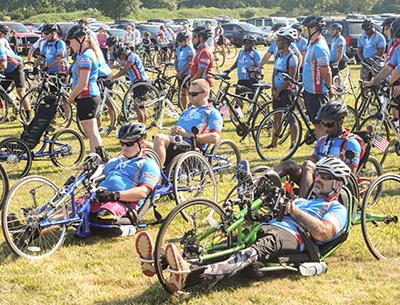Wounded Warrior Vindicated

Two organizations that last year condemned the Wounded Warrior Project, a highly visible charity on the East End, have reversed their assessments of the nonprofit and given it their stamps of approval.
Wounded Warrior’s Soldier Ride was founded on the South Fork and occurs here each year, with broad support, but the national organization was dogged by media reports alleging misuse of donations, including lavish spending.
Early last month, however, both the Better Business Bureau’s Wise Giving Alliance and Charity Navigator, a nonprofit that provides “objective ratings to find charities you can trust and support,” according to its website, awarded the Wounded Warrior Project their highest ratings.
The Wise Giving Alliance accredited Wounded Warrior Project, verifying that the organization meets the alliance’s 20 standards for “charity accountability,” and Charity Navigator gave it its top, four-star rating, with an overall score of 90.40 out of 100, noting that it meets all 12 of Charity Navigator’s “accountability and transparency performance metrics.”
News reports last year by CBS and The New York Times alleged extravagant spending and waste at the Wounded Warrior Project and criticized the group for “aggressive styles of fund-raising, marketing, and personnel management.” The allegations resulted in the dismissal of Wounded Warrior’s top two executives.
But locals who initiated Soldier Ride, a bike-riding event for veterans that now sponsors rides worldwide and has raised significant money for the Wounded Warrior Project, defended the organization last year and have maintained that the news reports were unfounded.
In a letter to the editor last month, Peter Honerkamp, a managing partner at the Stephen Talkhouse in Amagansett, where the idea for Soldier Ride was dreamed up and took shape, and who, with other founders, remains involved in organizing its events, refuted the specifics of news reports, which, he said, “got it all wrong.”
Mr. Honerkamp said that the details surrounding information in the news reports were examined and repudiated in an 80-page independent report issued in September by Doug White, a nonprofit expert and author.
Mr. White concluded that the media reports “simply got the facts wrong,” and said in interviews that the Wounded Warrior Project’s “finances were sound and its impact strong.”
Mr. Honerkamp decried the impact of the negative reporting about Wounded Warrior, pointing out its impact on the donations that support programs for wounded veterans. Two of the group’s founders had been vilified and a number of people who worked for Wounded Warrior lost their jobs, he said.
The Better Business Bureau reports on its Wise Giving Alliance website that it reviewed detailed information provided by Wounded Warrior Project about the matters raised in the media reports, obtained answers to numerous questions, and held meetings with staff and board members, as well as with those who conducted the independent, third-party review of Wounded Warrior’s operations.
The result was the full accreditation, and a report that endorsed Wounded Warrior’s operations. “There was no evidence of lavish spending,” it said. The reports cites a flawed methodology in, for instance, analyzing Wounded Warrior’s “program-expense ratio,” which resulted in the negative conclusions delineated in news reports. Its own close review found no such faults, the bureau said.
According to Charity Navigator, 75 percent of Wounded Warrior’s overall expenses go toward providing services to veterans, with fund-raising expenses accounting for 19 percent of the budget, and 5 percent going toward administrative expenses.
